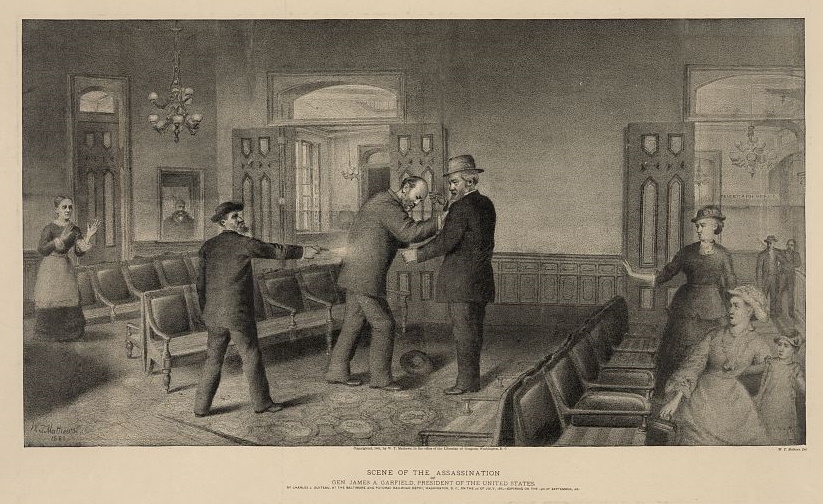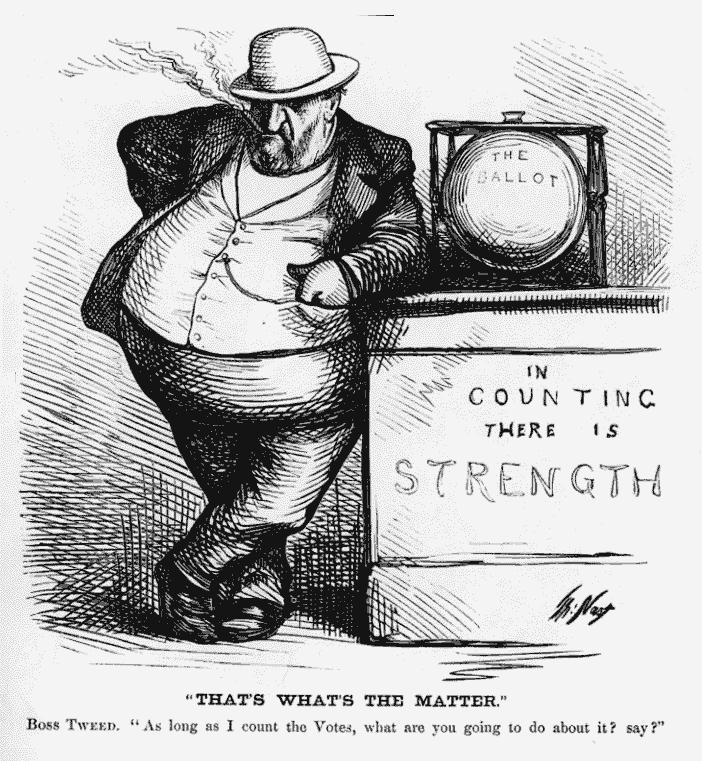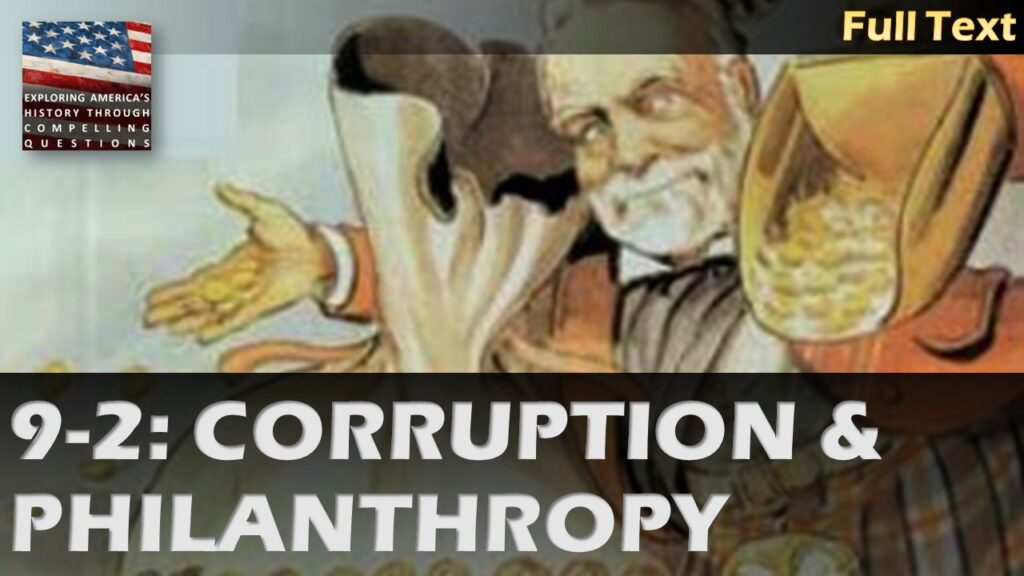
TRANSLATE

OTHER VERSIONS OF THIS READING
INTRODUCTION
The Gilded Age was a time during which a few people controlled most of America’s money. This inequality has repeated itself a various times in America’s history, including in the present. Wealth is often seen as a mark of success and the industrialists were either looked up to or reviled for their extravagant wealth, but certainly respected for the power their wealth bought.
Politicians in the Gilded Age understood the power of money. Many of them took money for business owners in exchange for favors. Bribery was common, and corruption in city government was so prevalent that it was practiced openly.
But the great monopolies of the past do not exist today, and although there are still dishonest politicians who take bribes for favors, our current situation is far better than the days of the Gilded Age. So, money did not always win out.
What do you think? Does money make you powerful?
THE FORGETTABLE PRESIDENTS
The Gilded Age is usually remembered for the accomplishments of thousands of American thinkers, inventors, entrepreneurs, writers, and promoters of social justice. Few politicians had an impact on the tremendous change transforming America. The Presidency was at an all-time low in power and influence, and the Congress was rife with corruption. State and city leaders shared in the graft, and the public was kept largely unaware. Much like in the colonial days, Americans were not taking their orders from the top; rather, they were building a new society from its foundation.
The American Presidents who resided in the White House from the end of the Civil War until the 1890s are sometimes called the Forgettable Presidents. A case-by-case study helps illustrates this point.
Andrew Johnson was so hated he was impeached and would have been removed from office were it not for a single Senate vote.
Ulysses S. Grant was a war hero but was unprepared for public office. He had not held a single elected office prior to the Presidency and was totally naive to the workings of Washington. He relied heavily on the advice of insiders who were stealing public money. His secretary of war sold Native American land to investors and pocketed public money. His private secretary worked with officials in the Treasury Department to steal money raised from the tax on whiskey.
Many members of his Administration were implicated in the Crédit Mobilier Scandal, which defrauded the American public of common land. Grant himself seemed above these scandals, but lacked the political skill to control his staff or replace them with officers of integrity.
His successor was Rutherford B. Hayes. Hayes himself had tremendous integrity, but his Presidency was weakened by the means of his election. After the electoral votes were counted, his opponent, Samuel Tilden, already claimed a majority of the popular vote and needed just one electoral vote to win. Hayes needed twenty. Precisely twenty electoral votes were in dispute because the states submitted double returns — one proclaiming Hayes the victor, the other Tilden. A Republican-biased electoral commission awarded all 20 electoral votes to the Republican Hayes, and he won by just one electoral vote.
While he was able to claim the White House, many considered his election a fraud, and his power to rule was diminished.
James Garfield succeeded Hayes to the Presidency. After only four months, his life was cut short by an assassin’s bullet. Charles Guiteau, the killer, was so upset with Garfield for overlooking him for a political job that he shot the President in cold blood on the platform of the Baltimore and Potomac train station. Secondary Source: Lithograph
Secondary Source: Lithograph
An artists’ rendition of the assassination of President Garfield by Charles Guiteau.
Vice-President Chester Arthur became the next leader. Although his political history was largely composed of appointments of friends, the tragedy that befell his predecessor led him to believe that the system had gone bad. He signed into law the Pendleton Civil Service Act, which opened many jobs to competitive exam rather than political connections. The Republican Party rewarded him by refusing his nomination for the Presidency in 1884.
One President impeached, one President drowning in corruption, one President elected by possible fraud, one President assassinated, and one disgraced by his own party for doing what he thought was right. Clearly, this was not a good time in Presidential history.
POLITICAL CORRUPTION
This was an era of congressional supremacy. The Republican Party dominated the Presidency and the Congress for most of these years. Both houses of Congress were full of representatives owned by big business. That is to say, big business owners donated such large sums of money to the politicians that the people’s elected leaders listened more carefully to their corporate supporters than to the voters themselves.
Laws regulating campaigns were minimal and big money bought a government that would not interfere. Similar conditions existed in the states. City governments were dominated by political machines. Members of a small network gained power and used the public treasury to stay in power — and grow fabulously rich in the process.
Becoming mayor of a big city in the Gilded Age was like walking into a cyclone. Demands swirled around city leaders. Better sewers, cleaner water, new bridges, more efficient transit, improved schools, and suitable aid to the sick and needy were some of the more common demands coming from a wide range of interest groups.
To cope with the city’s problems, government officials had a limited resources and personnel. Democracy did not flourish in this environment. To bring order out of the chaos of the nation’s cities, political bosses emerged who did not shrink from corrupt deals if they could increase their power bases. The people and institutions the bosses controlled were called the political machine.
Personal politics can at once seem simple and complex. To maintain power, a boss had to keep his constituents happy. Most political bosses appealed to the newest, most desperate part of the growing populace — the immigrants. Occasionally bosses would provide relief kitchens to receive votes. Individuals who were leaders in local neighborhoods were sometimes rewarded city jobs in return for the loyalty of their constituents.
Bosses knew they also had to placate big business, and did so by rewarding them with lucrative contracts for construction of factories or public works. These industries would then pump large sums into keeping the political machine in office. It seemed simple: “You scratch my back and I’ll scratch yours.” However, bringing diverse interests together in a city as large as New York, Philadelphia, or Chicago required hours of legwork and great political skill.
All the activities mentioned so far seem at least semi-legitimate. The problem was that many political machines broke their own laws to suit their purposes. As contracts were awarded to legal business entities, they were likewise awarded to illegal gambling and prostitution rings. Often profits from these unlawful enterprises lined the pockets of city officials. Public tax money and bribes from the business sector increased the bank accounts of these corrupt leaders.
Voter fraud was widespread. Political bosses arranged to have voter lists expanded to include many phony names. In one district, a four-year-old child was registered to vote. In another, a dog’s name appeared on the polling lists. Members of the machine would “vote early and often,” traveling from polling place to polling place to place illegal votes. One district in New York one time reported more votes than it had residents.
The most notorious political boss of the age was William “Boss” Tweed of New York’s Tammany Hall. For twelve years, Tweed ruled New York. He gave generously to the poor and authorized the handouts of Christmas turkeys and winter coal to prospective supporters. In the process, he fleeced the public out of millions of taxpayer money, which went into the coffers of Tweed and his associates.
Attention was brought to Tweed’s corruption by political cartoonist Thomas Nast. Nast’s pictures were worth more than words as many illiterate and semi-literate New Yorkers were exposed to Tweed’s graft. A zealous attorney named Samuel Tilden convicted Tweed and his rule came to an end in 1876. Mysteriously, Tweed escaped from prison and traveled to Spain, where he was spotted by someone who recognized his face from Nast’s cartoons. He died in prison in 1878.
Not until the dawn of the 20th century would serious attempts be made to correct the abuses of Gilded Age government. Primary Source: Editorial Cartoon
Primary Source: Editorial Cartoon
In this cartoon, Boss Tweed is depicted guarding the ballot box. This is critical of the role he and political machines played in manipulating elections to their advantage.
THE GOSPEL OF WEALTH
From these examples of graft in business and government, it would seem that men with wealth and positions of authority during the Gilded Age only thought of enriching themselves. However, this was not always the case. As mentioned earlier, many of the great industrialists of the era gave away huge sums of money. Steel magnate Andrew Carnegie is remembered for articulating this philosophy.
Carnegie put his ideas into print in 1889 in an article entitled “Wealth”, or as it is more commonly known, “The Gospel of Wealth”. In it, Carnegie describes the responsibility of the new upper class of self-made rich. He proposed that the best way of dealing with the new phenomenon of wealth inequality was for the wealthy to redistribute their surplus means in a responsible and thoughtful manner. Normally, wealthy families passed their fortunes down to the children, such as was the case in Europe. Carnegie disliked this idea arguing that dependents should be supported by their work, not with their parents’ money.
In The Gospel of Wealth, Carnegie asserted that hard work and perseverance lead to wealth, and made it clear that the duty of the rich was to live modest lifestyles. Carnegie argued that surplus wealth is put to best use when it is administered carefully by the wealthy. Carnegie also argued against wasteful use of capital in the form of extravagance, irresponsible spending, or self-indulgence, instead promoting the administration of money over the course of one’s lifetime toward the cause of reducing the difference between the rich and poor. Primary Source: Editorial Cartoon
Primary Source: Editorial Cartoon
In this cartoon, Carnegie is seen giving away his fortune to build libraries. It reflects the positive view of the industrialists as generous philanthropists.
Carnegie himself gave away his fortune building libraries across the nation. Some 2,509 libraries were built around the world with his money. In many towns, the main library is still known as the Carnegie Library. Carnegie-Mellon University and Carnegie Hall in New York City were also established with his financial support.
CONCLUSION
The influence of money in politics is not a story that is restricted to the Gilded Age. Of course, people with money have advantages that the poor do not, and one of these advantages is the ability to use money to influence others.
Sometimes, business owners manipulated politicians. Sometimes they used money to buy votes and became politicians themselves. In cities, elected officials formed political machines and used their access to tax money to enrich themselves and be reelected.
At the same time, however, men like Andrew Carnegie used some of their financial power to benefit humanity through philanthropy.
As you will learn in later readings, the corruption that was rampant in the Gilded Age was outlawed when voters acted together to make change. Instead of a few individuals with access to money, the collective power of the common citizen won out. Some would argue that we are again in a time when the 1%, the few super-rich, are again making decisions and influencing politics.
Based on what you know of the Gilded Age, what do you think? Does money make you powerful?
CONTINUE READING

SUMMARY
BIG IDEA: The late 1800s was a time of both enormous political corruption and the beginning of corporate philanthropy.
The years after the Civil War saw a series of forgettable presidents who did not have much power relative to Congress. One thing government dealt with was corruption. The Pendleton Civil Service Act made many government jobs open to candidates based on competitive exams. This helped limit the spoils system of giving jobs as rewards for supporting political candidates.
This period was also a time of corruption in city governments. Big city mayors used their power to give jobs and contracts to friends. In exchange they bought votes, stayed in power, took bribes, and became rich. These political machines were common. The most famous was nicknamed Tammany Hall in New York.
Money was not always as source of corruption and evil. Andrew Carnegie’s essay the Gospel of Wealth encouraged the wealthy to use their money to benefit humanity.

VOCABULARY

KEY CONCEPTS
Mayor: The elected chief executive of a city.
Political Machine: A system set up in cities in which elected leaders buy or manipulate votes. They accepted bribes and stole government money. In exchange, they lavished favors on friends who protected and supported them. The most famous was Tammany Hall in New York City.
Boss: Leader of a political machine. The most famous was William Tweed of Tammany Hall in New York City.
Bribe: Money paid to a government official in exchange for a favor. For example, business leaders paid members of congress to pass or not pass certain legislation. Andrew
Voter Fraud: Any method of manipulating elections including, voting multiple times, voting in someone else’s name, or purposefully not counting some votes.
The Gospel of Wealth: Article by Carnegie. In it he argued that making money was noble but that wealthy people should give away their fortunes to the benefit of mankind.
Carnegie Library: Name for libraries built with Andrew Carnegie’s financial support. Some are still officially called by this name, such as in Pittsburg, Pennsylvania.
![]()
PEOPLE AND GROUPS
Ulysses S. Grant: General and hero of the Civil War who became president. Although honest, he was a poor politician. His administration was weakened by the Crédit Mobilier Scandal.
Rutherford B. Hayes: Republican President elected in 1877 as part of a compromise that ended Reconstruction in the South. His influence was weakened by the circumstances of his election.
James Garfield: Republican president who was assassinated by Charles Guiteau, who was angry that he had not received a government job.
Chester Arthur: Vice-president who ascended to the presidency when James Garfield was assassinated. He signed the Pendleton Civil Service Act which limited the spoils system.
William “Boss” Tweed: Famous boss of the Tammany Hall political machine.
Tammany Hall: Nickname for Boss Tweed’s political machine in New York City.
Thomas Nast: Cartoonist whose drawings criticized Boss Tweed and the Tammany Hall political machine.

LAWS
Pendleton Civil Service Act: 1883 law limiting the spoils system by requiring that many government employees pass an exam. This helped establish a group of professional government employees outside the influence of politics. It was passed after the assassination of President Garfield by a disgruntled job seeker.
![]()
EVENTS
Crédit Mobilier Scandal: Political scandal during Grant’s presidency. His aids enriched themselves with the sale of public land.



